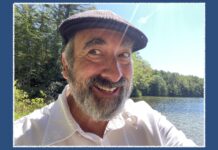Where biologically-oriented psychiatry is the default — perhaps the only — response to mental health crises, it may be hard to see how radically different Open Dialogue actually is. Including social networks in crisis response might seem like a simple (even obvious) extension of “treatment as usual.” It may even seem like — or become — an extension of case management, and compliance. Medical schools train their students to take control — and responsibility — in a crisis; to provide comfort and reassurance to people who are suffering and afraid, by providing solutions with an authoritative voice.
Psychiatrists in Open Dialogue, however, work within teams in which their expertise, though valued, is but one voice in a process based on the belief that any one person’s mental health depends on conditions in which all voices will be heard, and responded to.
Thomas Ihde, one of the panelists on the next HOPEnDialogue/Open Excellence/MIA “Town Hall on Open Dialogue in a Time of Crisis” (Friday, February 12 at noon EST) notes that when he and his colleagues introduced Open Dialogue to their region, their medical board criticized them for “watering down” physicians’ role. The board’s review found, however, that physicians found their work on “mixed” teams, in a dialogical fashion, was both easier and more effective than their previous medically-focused standard of care. The board was surprised, in fact, by “how happy and content everyone was, and that none of our physicians could understand what they meant by the ‘watering down’ of their role.”
Our panel on February 12 will explore how psychiatrists outside of Western Lapland who have been inspired by Open Dialogue have been inspired, as well as how they have met the challenges of transitioning to working “dialogically.”
“Open Dialogue has opened a way for me to be the best doctor I can be, as part of a clinical team, with enough time and space for all of us to be present as fully embodied human beings,” says panelist Chris Gordon. “This creates a space in which the person can be heard and supported, in which practitioners can offer their knowledge with humility and care, in which truly shared decision-making can occur.”
Sandy Steingard, another panelist, says that working with Open Dialogue has allowed her to be “less reliant on a flawed diagnostic system, and to incorporate multiple perspectives into the clinical decision-making process.”
How have psychiatrists met the institutional and economic obstacles to adapting Open Dialogue-inspired work? How have psychiatrists incorporated Open Dialogue’s research that found that medicating later, if at all, and in smaller amounts and for shorter times improved outcomes? And, how has taking on these challenges changed psychiatrists sense of their work, or their clients, and of themselves?
Please join our panel of psychiatrists from Switzerland, Spain, Italy and the U.S. on Friday, February 12 at noon Eastern U.S. time (5:00 pm London time) to discuss these and other crucial questions of bringing Open Dialogue to a world in crisis.















We’re not interested in psychiatrists, any kind of psychiatrist other than to get rid of them. We are interested in psychiatry being abolished and outlawed for historical and ongoing major crimes against humanity.
Report comment
Thank God SPB. Your absence has been torturous. Just as I’m about to reach my tolerance level you show up with the sort of simple clarity I needed to hear. Looks like you’re still a survivor — at least your thinking is intact! 🙂
Report comment
Removed for Moderation.
Report comment
“notes that when he and his colleagues introduced Open Dialogue to their region, their medical board criticized them for “watering down” physicians’ role. The board’s review found, however, that physicians found their work on “mixed” teams, in a dialogical fashion, was both easier and more effective than their previous medically-focused standard of care. The board was surprised, in fact, by “how happy and content everyone was, and that none of our physicians could understand what they meant by the ‘watering down’ of their role.”
Well you know me, I’m the negative ninny.
I think really what happened is, that the OD got “watered down”. Psych cannot co-opt it, it could not be true OD. And who was happier? The “physicians”?
Pretty soon there will not be OD. Not that it matters. The shrinks have no time for true OD. And it’s NEVER true OD if there are professionals. Look how many americans went down to Trieste and look how nothing changed. It gave them a nice trip to Italy and a chance to hear themselves talk after they got back.
But I think that the guy(Roberto Mezzina) in Trieste is all too aware of how his approach will not work, because it is the person that makes it work, not some “program” or “training”. It is ALWAYS about the people that started it. It worked originally because of a passion, not a desperate attempt because you became a shrink and see that what you’re doing is not just failing but becoming downright harmful and abusive.
And we do know that there are an AWFUL LOT of very abusive people that have control over vulnerable people.
http://file.lacounty.gov/SDSInter/dmh/1054552_TriesteConceptPaper-4-18-2019FINAL.pdf
“Sandy Steingard, another panelist, says that working with Open Dialogue has allowed her to be “less reliant on a flawed diagnostic system, and to incorporate multiple perspectives into the clinical decision-making process.”
“less reliant on a flawed diagnostic system” I think adopting “some” OD, knowing you work within a “flawed” system, shows that no one is really willing to actually get RID of the flawed system. Lets bring in more stuff, instead of dealing with the rotten core.
Report comment